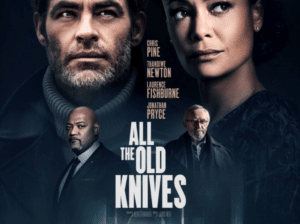
All the Old Knives
Eight years after a tragic terrorist attack in Vienna, during which a group of Islamic extremists took a scheduled flight hostage and killed all the passengers, Henry Pelham, a CIA agent stationed in the Austrian capital at the time, was assigned to interrogate his colleagues at the time, who managed the kidnapping with him and failed, with the aim of finding out who the mole was who messed up the rescue operation. Henry therefore goes to Celia Harrison, the former colleague with whom he was in love and with whom she was about to live, and interrogates her during a long and tense dinner. Who cheated in Vienna? And what is left of the love that once bound Henry and Celia?
As in a novel by Le Carrè, The dinner of spies intertwines spy story and sentimental plot. However, the manner changes, no longer traditionally romantic, but stratified, with intertwined temporal planes and narrative lines that converge in a dramatic meeting point.
The screenwriter of the film is the same author of the novel on which it is based, Olen Steinhauer, who published “All The Old Knives” in 2016 and has now adapted it for the cinema: also for this reason, in terms of writing, the film builds cleverly a plot that working on two timelines – the assault on the plane and the management of the crisis and the interrogation of Celia by Henry, preceded by that of her ex boss – proceeds little by little towards a revelation fruit of twists and turns and perspective changes.
If the search for the mole belongs to the classic repertoire of spy literature (as well as the fact that the solution to the plot appears clear after a while, according to the rule that the devil lurks in the details…), the construction of a Dual storylines thicken the mystery and make the moment of discovery final, if not surprising, undoubtedly well-crafted.
The very idea of the dinner as a narratively and symbolically pregnant moment works, because it concentrates and at the same time expands the action, forcing the spectator to remain concentrated, on the one hand, on the reconstruction of the events of eight years earlier (the attack, the attempt by agents to contact the sources, the discovery through telephone records of the existence of a spy among spies…) and on the other hand on the evolution of the sentimental plot between the two protagonists, also in this case divided between the past (the passion , sex, sharing a life in common) and present: she, Celia, played by Thandie Newton, is done with espionage, got married and has two children; he, Henry, continues to work for the CIA and behind the aplomb of the charming man (played by Chris Pine similar to Pierce Brosnan) hides a ferocious soul. It is a pity that the entire narrative scaffolding – as much as it triggers the regret of a cinema capable of constructing complex plots without necessarily complicating its own structure, between temporal comings and goings, pieces of history revealed and others hidden, red herrings and so on – does not have the support of an adequate staging, reticent in the part set in Vienna to show violence or to insist on the ambiguity of the agents (the head of the section played by Laurence Fishburne, the old fox Bill Compton by Jonathan Pryce…) and guilty, in the confrontation at dinner between the two spies in love, to immerse the restaurant where the two meet in a glossy atmosphere, with photography that fails to abstract the figures and creates heavy visual effects (shots with fish-eye camera, overlays crossed, details, very close-ups…).








